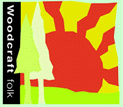The Woodcraft Folk
 We're an educational movement for children and young people, designed to develop self-confidence and activity in
society, with the aim of building a world based on equality, peace, social justice and co-operation. We operate in England, Scotland and Wales.
We're an educational movement for children and young people, designed to develop self-confidence and activity in
society, with the aim of building a world based on equality, peace, social justice and co-operation. We operate in England, Scotland and Wales.
So what are we actually doing?
Woodcraft Folk groups meet weekly, enjoying a varied programme including games, drama, craftwork, singing and dancing, as well as following an educational programme based on our aims and principles. Hiking, hostelling and camping are also undertaken at weekends or during summer
holidays.
What makes the Woodcraft Folk special?
- It's co-operative. We encourage children and young people to work together to share their skills and
enthusiasm.
- It believes in equal opportunities and access for all its members. This means being able to discuss and challenge
discrimination.
- It is open to people of any religion or none.
- It aims to empower young people to make decisions themselves and to take an active part in the world about them
- It is dedicated to the building of a more peaceful future.
- It promotes an understanding of the need to protect our environment and the use of the world's
resources.
- It has exchanges with similar organisations throughout the world. Our international links help to further our motto: Span the World with
Friendship.
How do we organise our groups?
Group nights last between one and two hours, depending on the age of the children or young people. We divide our groups by age:
-
Under sixes are known as 'Woodchips'
-
Six to nine year olds are known as 'Elfins'
-
Ten to twelve year olds are 'Pioneers'
-
Thirteen to fifteen year olds are 'Venturers'
-
Our older teenagers and young adults organise their own activities, and are known as District Fellows... or more usually just as DFs.
Who organises the activities?
Group activities are co-ordinated by adult volunteers, who hold regular informal meetings to plan the weekly programme of activities. We try always to include suggestions put forward by the children and young people.
How many groups are there?
We have currently have about 500 groups meeting around the country, mainly in urban areas.
Who pays for the Woodcraft Folk?
Children pay small weekly subscriptions, towards the cost of running group nights and trips away. Adult volunteer members and supporters pay an annual membership subscription. The central organisation receives a small grant from the UK's Department for Education and Employment, and also relies on donations from supporters, from trade unions and from businesses which are sympathetic to our aims and objectives. In particular, the Woodcraft Folk has historical links with the British retail cooperative movement, who generously support our work financially. We are a registered charity.
What does your name mean?
No, we don't spend all our time doing woodwork. The name 'woodcraft' was used by the influential writer and naturalist Ernest Thompson Seton at the turn of the twentieth century. Woodcraft in this context meant the skill of living in the open air, close to nature. The Woodcraft Folk, like other youth movements, traces its origins back to Ernest Thompson Seton's pioneering work with north American young people.
What are its origins?
Whilst sharing many of the same historical roots as the Scout movement, the Woodcraft Folk's direct antecedent was an organisation led by a charismatic ex-Scout John Hargrave, who had broken with the Scout's militaristic approach in the years immediately after the First World War. The Woodcraft Folk was established in 1925 after a south London group had challenged Hargrave's authoritarian tendencies. The Woodcraft Folk when first established was run by young people, with Leslie Paul the first Woodcraft Folk leader nineteen at the time.
Do you organise elsewhere in the world?
No, but the Woodcraft Folk has sister organisations throughout the world, through its membership of the Brussels-based federation of progressive youth organisations, the International Falcon Movement (IFM-SEI). Woodcraft Folk young people and children take part in camps abroad run by the IFM-SEI and by its other affiliates. About every 6 years, the Woodcraft Folk also runs its own International Camps in Britain: the last was held in Nottinghamshire in the summer of 2001.
How are policies decided in the Woodcraft Folk?
We are a democratic organisation. Our annual conference, attended by delegates from our groups and local districts, is the ultimate decision-making body. Between annual conferences, responsibility for running the organisation falls on the members of the General Council. We are proud of the fact that about half of our current General Council are young people under 25 years of age.
Contact:
phone: +44 20 8672 6031
fax: +44 20 8767 2457
13 Ritherdon Road
London SW17 8QE
United Kingdom
eMail: info@woodcraft.org.uk
http://www.poptel.org.uk/woodcraft
 We're an educational movement for children and young people, designed to develop self-confidence and activity in
society, with the aim of building a world based on equality, peace, social justice and co-operation. We operate in England, Scotland and Wales.
We're an educational movement for children and young people, designed to develop self-confidence and activity in
society, with the aim of building a world based on equality, peace, social justice and co-operation. We operate in England, Scotland and Wales.